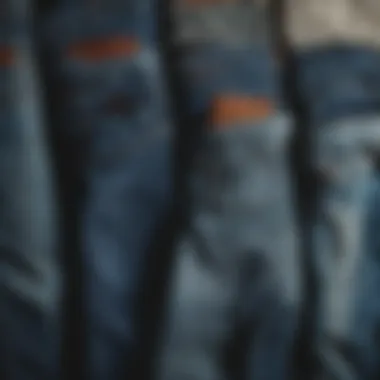Exploring Madewell's Jean Buyback Initiative


Intro
Madewell's jean buyback initiative stands out in a fashion landscape increasingly concerned with sustainability. This program invites consumers to return their old jeans, contributing to a circular economy and reducing textile waste. In this article, we will explore the implications of this initiative for sustainable fashion, consumer behavior, and the overall impact on the denim industry.
Understanding this initiative involves examining its procedural aspects, environmental significance, and the response it has garnered from both consumers and industry professionals. As society becomes more aware of its ecological footprint, programs like Madewell's can ignite conversations about shopping habits and sustainability within the fashion sector.
The following sections will delve into various aspects of the initiative, highlighting the key points and the relevance of sustainable practices in today's fashion industry.
Intro to Madewell's Jean Buyback Program
Madewell's Jean Buyback Program represents a significant step within the brand’s commitment to sustainable fashion. In a world where fast fashion poses a growing concern for the environment, initiatives like this are increasingly relevant. This program not only aims to reduce textile waste but also engages consumers in the recycling process, enhancing their awareness of sustainable practices.
Understanding this initiative is essential as it addresses critical issues associated with denim production. Denim is infamous for its resource-intensive production processes. The Jean Buyback Program reflects a broader movement in the industry, seeking to counterbalance these environmental impacts. By recycling old jeans, Madewell encourages consumers to actively participate in eco-friendly practices, rather than passively consuming.
This section will unpack important elements of the program, including its alignment with the brand's core values and the goals it seeks to achieve. It seeks to articulate how these efforts not only contribute to sustainability but also empower customers to be part of the solution.
Overview of Madewell's Brand Values
Madewell stands out in the fashion industry for its strong emphasis on craftsmanship, originality, and sustainability. The brand's commitment to producing durable products aligns with its overarching mission to lessen environmental impact. Each piece is designed with longevity in mind, promoting thoughtful consumerism.
Madewell views fashion as more than just clothing; it is an expression of identity and a vehicle for positive change. The integration of environmental consciousness into their brand ethos is evident in every aspect of their operations, from sourcing materials to their community initiatives. This focus underscores the importance of transparency and ethical production processes, aiming to foster trust with their consumers.
Goals of the Buyback Initiative
The primary goal of Madewell's Jean Buyback Initiative is to minimize textile waste produced by the fashion industry. By encouraging customers to return their old denim, Madewell reduces the chances these items end up in landfills. The initiative also aims to educate consumers about the impact of their buying choices.
Another goal is to promote the concept of a circular economy within the denim market. By recycling old jeans, the program allows for the potential reuse of materials, creating new products while conserving resources. This approach helps to establish a sustainable model that other brands might emulate.
In essence, the buyback initiative positions Madewell as a leader in sustainable fashion. It seeks to not only transform how consumers view their clothing but also to inspire a paradigm shift within the denim industry as a whole. Engaging consumers in this way can foster a deeper understanding of sustainability and its importance in today’s context.
"Sustainability is not just a trend; it represents a fundamental shift in how we approach fashion."
Details of the Buyback Process
The buyback initiative from Madewell is more than just a marketing strategy. It embodies a thoughtful approach to sustainability and circular fashion. Focusing on the process involved in this initiative illuminates the efforts Madewell makes in promoting eco-friendly practices while engaging its customer base. Understanding the details behind this buyback program helps potential participants know how they can contribute to reducing textile waste.
Eligibility Criteria for Jeans
To take part in the buyback initiative, customers must ensure that their jeans meet certain eligibility requirements. The program targets well-worn denim, specifically those made by Madewell. However, jeans from other brands can also qualify. The jeans accepted are typically those that have visible signs of wear, like fraying edges, faded colors, or small holes. This approach speaks to Madewell's commitment to sustainability by encouraging consumers to think seriously about extending the life of their garments. It also reduces waste by using jeans that might otherwise end up in landfills.
The key points of eligibility are:
- Brands accepted include Madewell and some other well-known brands.
- Jeans must be at least partially made of denim.
- Condition should allow for recycling, even if the jeans have seen better days.
Steps to Participate in the Buyback Program
Participating in Madewell's jean buyback program involves a straightforward series of steps designed for convenience. This streamlined process ensures that customers can easily contribute to sustainability efforts. Here’s how one can engage with the program:


- Gather Jeans: Identify the jeans you wish to recycle. Ensure they meet the criteria mentioned above.
- Visit a Store or Online Platform: You can either visit a Madewell store or use their online system, depending on your location.
- Submit Your Jeans: At the store, there will be designated areas for drop-off. If you use the online platform, follow the specific guidance for mail-in submissions.
- Receive Rewards: Once your jeans are accepted, Madewell provides rewards, typically in the form of store credit. This incentivizes customers to participate, making the buyback program mutually beneficial.
What Happens to the Recycled Jeans?
Understanding the fate of the recycled jeans is crucial to appreciate the broader impact of the program. Once the jeans are collected, they undergo a careful evaluation and sorting process. Jeans that can be reused may be cleaned and given a second chance in the resale market or donated to communities in need.
For those jeans that are unsuitable for direct reuse, Madewell employs sustainable fabric recycling methods. They partner with companies that specialize in textile recycling. This ensures that the materials are processed in a way that minimizes environmental impacts. The resulting fibers can be used to create new fabrics, thus completing the cycle of sustainability.
By participating in the buyback program, you are not only cleaning out your closet but also playing a crucial role in reducing waste and promoting a circular economy.
In summary, the buyback process is essential for enhancing awareness on sustainable practices while providing an accessible route for participation. This model shifts perceptions about textile recycling and encourages all consumers to engage with more conscious practices.
Environmental Impact of the Buyback Initiative
Madewell's jean buyback initiative seeks to mitigate environmental harm caused by textile waste. This section elaborates on how this program not only aligns with the brand's values but also addresses a growing need for sustainable practices within the denim industry.
Reduction of Textile Waste
Textile waste is a pressing issue globally. According to recent studies, millions of tons of clothing end up in landfills each year. Denim, in particular, poses a challenge due to its durability and slow degradation rate. When consumers return old jeans to Madewell, they effectively reduce the amount of waste that would otherwise contribute to landfill overflow.
The buyback program encourages customers to think about their consumption habits. Consumers are reminded that every small action counts. The initiative provides a practical solution by turning unwanted items into opportunities for recycling. By taking part in this program, customers help decrease textile waste accumulation.
"Every pair of jeans returned is a step toward a more sustainable future for our planet."
This change is not just about the jeans themselves, but also about fostering a mindset that prioritizes sustainability. Less waste means fewer resources spent on producing tags, buttons, and fibers. Simply put, the more people engage with this initiative, the greater impact it has in preserving our environment.
Sustainable Fabric Recycling Practices
Recycling fabrics is an essential component of sustainable fashion. Madewell's buyback program integrates sustainable fabric recycling practices. The denim collected gets transformed into new products, which means fewer raw materials are needed for production. This is a crucial aspect of environmental conservation, as traditional cotton farming is water-intensive and uses harmful pesticides.
The process involves sorting the returned jeans and determining their condition. Usable jeans may be resold, while damaged ones are converted into new fabric. This not only reduces the need for new cotton but also minimizes energy costs associated with manufacturing from scratch.
Here are some key benefits of sustainable fabric recycling:
- Less Resource Consumption: Saves water and energy needed for new fabric production.
- Decreased Carbon Footprint: Reduces greenhouse gas emissions linked to the fashion industry.
- Innovation and Growth: Creates new markets for recycled materials.
- Encouragement of Consumer Behavior Change: Promotes awareness of sustainable practices.
By implementing these recycling practices, the buyback initiative serves as a model for other brands. It sets a benchmark for industry standards regarding waste reduction and showcases the potential for innovation within the realm of sustainability.
In summary, the environmental impact of Madewell's jean buyback initiative is multifaceted. It not only plays a vital role in reducing textile waste but also paves the way for sustainable practices in the fabric recycling process. As consumers embrace this initiative, they also contribute to a larger movement aimed at driving meaningful change in the fashion industry.
Consumer Perspectives on the Buyback Program
The consumer's viewpoint is vital in understanding the success and future of Madewell's jean buyback program. As this initiative is rooted in sustainability, it relies heavily on consumer engagement and awareness. When customers actively participate, they not only contribute to ecological efforts but also shape the brand's direction. Addressing consumer perspectives allows for a comprehensive understanding of how this program can align with broader sustainability trends and impact individual choices.
Customer Awareness and Engagement
Customer awareness of the buyback program plays a crucial role in its effectiveness. The initiative aims to inform shoppers about the environmental implications of their fashion choices. Madewell has used various marketing strategies to promote the buyback program, including social media campaigns and in-store promotions. This approach helps establish a connection between consumers and sustainability.


Engaging with customers means more than just informing them; it also requires fostering a sense of community around shared values. When customers are aware of the impacts of fast fashion, they are more likely to take part in programs like this. Madewell's efforts to educate their customers can lead to greater participation rates and a stronger commitment to sustainable fashion.
Influence on Purchase Decisions
The presence of a buyback program can significantly shape consumer purchase decisions. Many buyers now consider the sustainability practices of brands when deciding to shop. For Madewell, having a buyback program enhances its appeal to environmentally conscious shoppers. Customers are more inclined to purchase jeans from Madewell, knowing there is a tangible option for recycling worn items.
Furthermore, the program may prompt consumers to think critically about their purchases. Buyers might choose quality over quantity, aiming for items they can recycle later. This adjustment in consumer mindset fosters a responsible approach to shopping, supporting brands that embrace eco-friendly practices while minimizing waste.
In summary, consumer perspectives directly influence the effectiveness and future success of Madewell’s jean buyback program. Awareness and engagement encourage sustainable practices while shaping purchase decisions in favor of brands that prioritize environmental responsibility.
By analyzing these angles, it becomes clear that Madewell not only seeks to mitigate environmental impacts but also to cultivate a loyal customer base that values sustainability.
Criticism and Challenges of the Program
The exploration of criticism and challenges faced by Madewell's jean buyback program is essential to understand its overall effectiveness and sustainability goals. While the program seeks to promote responsible consumerism and reduce textile waste, it is not without its limitations and scrutiny. Addressing these criticisms helps in evaluating the real impact of such initiatives, pushing for improvements and transparency in sustainable practices within the fashion industry.
Potential Limitations of the Buyback Model
Despite the well-meaning nature of the buyback program, various potential limitations emerge. First, not all denim items are eligible for buyback. Such restrictions can lead to consumer frustration and might discourage participation. Customers may feel that their contribution to sustainability is rendered insignificant if their jeans do not meet specific criteria. Further, the buyback credits provided may not always match the perceived value of their items. This creates a disconnect between the customer's expectations and the incentives offered by the program.
Financing is another critical aspect to consider. The buyback model depends on high participation rates to sustain itself. However, if the program does not attract enough consumers who routinely purchase Madewell jeans, it may struggle to maintain economic viability. This could limit the program's scope and impact.
Another concern is what happens to the jeans after they're collected. If there’s a lack of transparency around the recycling process or if the jeans are not adequately reused or recycled, consumers may become skeptical about the program's intentions.
Comparative Analysis with Competitors
Madewell is not alone in implementing a buyback program. Major brands like Patagonia and Levi's have already established their own initiatives aimed at recycling and reusing garments. By comparing Madewell's approach to these competitors, we can identify both strengths and weaknesses.
- Patagonia: Known for its transparency, Patagonia has been a pioneer in sustainable practices. Its Worn Wear program encourages customers to trade in used gear for store credit, and it transparently shares the environmental benefits of these practices.
- Levi's: Levi's has implemented a similar initiative known as the Wellthread collection, which focuses on sustainability and takes back old denim to recycle into new products. The brand emphasizes innovation in material and processes, which is an attractive quality for consumers.
Madewell's competitors often promote their programs with clear communication about environmental impacts and offer broader eligiblity. Madewell must address these aspects to remain competitive in the growing sustainable fashion market.
"Understanding both the benefits and challenges of sustainable initiatives is vital for brand transparency and customer trust."
Overall, while Madewell's jean buyback initiative has commendable goals, the outlined criticisms and challenges reveal areas for improvement. A clear approach to addressing these issues can lead to more effective strategies, ultimately contributing to a greater impact on sustainability in the fashion industry.
Success Metrics for the Buyback Initiative
Success metrics are critical to understand if Madewell's jean buyback initiative truly makes an impact. These metrics help in evaluating the effectiveness and sustainability of the program. Without clear metrics, it is challenging to determine the strengths and weaknesses of the buyback initiative. Incorporating measurable elements assists both the company and its consumers in assessing progress. This section will focus on two main evaluation areas: measuring environmental benefits and evaluating customer participation rates.
Measuring Environmental Benefits
To truly grasp the environmental impact of the buyback program, precise measurements of benefits are essential. Madewell aims to reduce textile waste significantly through this initiative. It is crucial to identify how many jeans are returned and recycled. By calculating the weight of textiles diverted from landfills, stakeholders can gauge success. Additionally, analyzing the reduction in carbon emissions, water, and energy usage due to recycling processes is important. These metrics provide insights into how effectively the program contributes to sustainability.
For effective measurement, data can be captured in various ways. Regular audits can be conducted to track jeans collected and processed. This data collection assists in creating annual reports that summarize achievements.
"Measuring environmental benefits is not just quantitative; qualitative aspects matter too, such as community awareness about sustainable fashion."


Engaging with environmental experts can provide insights into endorsed recycling practices. The use of independent certifications can further enhance credibility in the effectiveness of the program. Results from these evaluations can inform future initiatives, helping to refine processes and improve outcomes.
Evaluating Customer Participation Rates
Customer participation rates serve as a fundamental metric for the overall success of the buyback program. Understanding how many consumers engage with the initiative gives a clear picture of its reach. Higher participation indicates a greater impact on sustainability, while lower numbers may signal issues in consumer awareness or program accessibility.
To evaluate participation effectively, tracking systems such as digital sign-ups and in-store transactions can be employed. Surveys can also gather feedback on consumer experiences and perceptions. This data can show trends over time, revealing whether awareness campaigns are successful.
Consumer willingness to return jeans for recycling reflects the program's effectiveness. Participation can also be influenced by the perceived value of incentives offered, such as discounts or store credit. If consumers see tangible benefits, engagement will most likely increase.
In summary, both environmental benefits and customer participation rates are vital metrics for Madewell’s buyback initiative. These metrics not only evaluate success but also provide insights that can drive improvements and foster a culture of sustainability.
The Future of Sustainable Fashion at Madewell
Sustainable fashion is more than a trend; it is a necessary evolution in the apparel industry. Madewell's commitment to this cause signifies a thoughtful and strategic move towards a more sustainable future. This approach not only aligns with the growing consumer demand for environmentally conscious practices but also sets a precedent for others in the fashion industry. As a prominent denim brand, Madewell’s initiatives can have far-reaching implications, influencing both customer choices and industry standards.
Predicted Trends in Eco-Friendly Initiatives
As we look forward, several key trends in eco-friendly initiatives are already taking shape.
- Circular Fashion: This concept focuses on extending the lifecycle of products. Madewell's buyback program is part of this trend, aiming to create a closed-loop system where jeans are recycled and reused instead of ending up in landfills.
- Material Innovation: The future will likely see increased use of sustainable materials, such as organic cotton or recycled fibers. Brands may further invest in research to develop fabrics that reduce water and chemical usage.
- Transparency: Consumers are becoming more aware of the sourcing and production processes. Brands like Madewell are likely to adopt more transparent practices, providing information about their supply chains and sustainability efforts.
- Digital Tools: Technology plays an important role in sustainability. RFID tags and blockchain can help monitor product life cycles and foster accountability among brands.
These trends indicate a shift towards practices that minimize environmental impact and prioritize ethical manufacturing.
Role of Consumers in Driving Sustainability
Consumers have a powerful voice. Their choices influence brand behavior and market trends.
- Demand for Sustainability: As awareness grows, consumers are increasingly seeking products that are sustainable. This demand motivates brands like Madewell to innovate and improve their sustainability practices.
- Participation in Programs: Engagement in buyback initiatives exemplifies consumer support for sustainability efforts. When customers take part in programs, it not only demonstrates commitment but also encourages brands to invest more in environmentally friendly practices.
- Community Building: Consumers contribute to a larger movement by sharing their experiences and advocating for sustainable fashion. This community influence can lead to more brands adopting similar initiatives.
- Feedback Loop: Consumer feedback is invaluable for refining sustainability programs. Brands often rely on customer insights to improve their offerings, ensuring they align with consumer values.
"The shift towards sustainable fashion is fueled by informed consumers holding brands accountable for their practices."
In summary, the future of sustainable fashion at Madewell is poised to embrace innovative trends and responsive consumer roles. It is this cooperative environment that will enable the brand to elevate its commitment to sustainability while maintaining its fashion-forward ethos.
End
The conclusion of this article emphasizes the significant findings and implications of Madewell's jean buyback initiative. Understanding this program is crucial, as it signifies a broader movement toward sustainable fashion practices within the denim industry. Madewell's commitment focuses not only on improving their brand image but also contributes to key outcomes like waste reduction and responsible consumption.
Summary of Key Insights
The analysis reveals several key insights regarding the buyback program. First, the initiative encourages consumers to actively participate in sustainability, promoting awareness of textile waste's environmental consequences.
- The process is user-friendly, allowing customers to return their unwanted jeans easily.
- Feedback from consumers shows increasing demand for brands that prioritize sustainability.
- Recycled materials are utilized in new products rather than adding to landfill waste.
Moreover, the initiative aligns with Madewell's core values, Lauding authenticity and a commitment to community engagement. Each of these aspects contributes to a more informed and responsible consumer market.
Final Thoughts on Sustainability in Fashion
Sustainability in fashion goes beyond mere programs like the buyback. It involves a systematic change in how production, consumption, and disposal are viewed.
- Consumer Empowerment: The role of consumers cannot be understated. Many prefer brands that show substantial commitments to sustainable practices, which is changing market dynamics.
- Industry Challenges: Despite positive feedback, challenges persist in scaling these initiatives and ensuring long-term effectiveness.
- Future Directions: The future of fashion may hinge on continuous innovation and broader industry collaboration.
"Sustainable fashion is not just a trend; it is a responsibility that all stakeholders must share."



